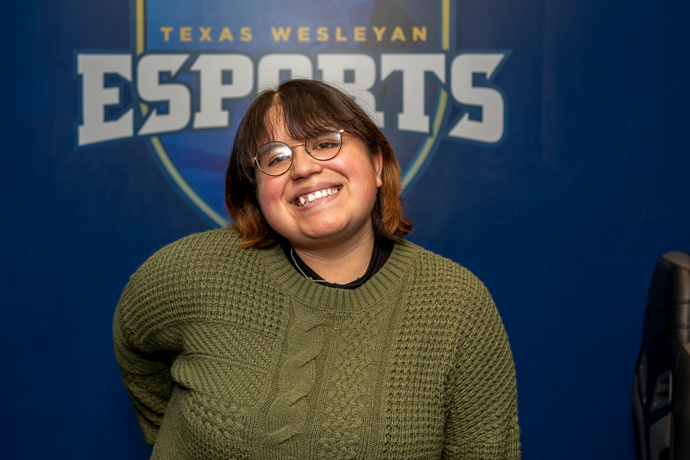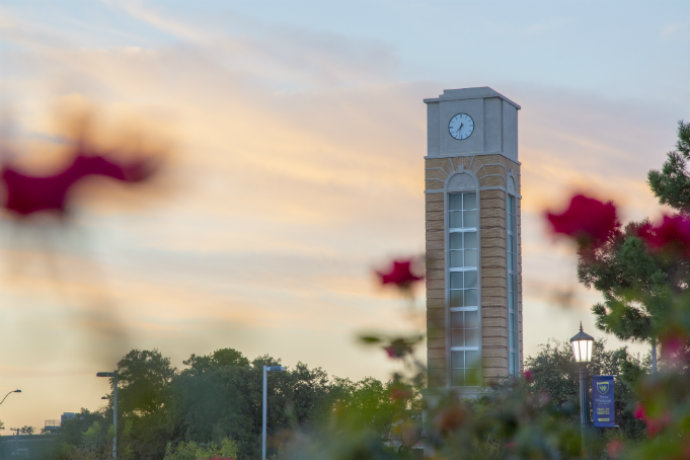Women in Esports: Cindy Flores researches using video games in physical therapy

We all know that confidence is key – and that’s exactly what Cindy Flores, senior exercise science major, emanates when talking about her passion for helping others.
Cindy has loved playing video games her whole life, saying that it allows her to decompress and help de-stress from her busy schedule. But as a young woman headed into the esports and medical field, she’s faced barriers she hopes to break down for the next generation of women and people with disabilities.
“I love video games. I made it practically my personality at one point,” she laughed.
As a freshman in high school, Cindy had surgery to remove a brain tumor. For about a year after, she became discouraged, feeling that people would look at her differently or that she wouldn’t be able to do as much as she’d like since the tumor had disabled her.
However, with the love and support of her mom and boyfriend, she fought to become more confident than ever before. It was during her sophomore year that she had a pivotal moment that made her want to fight to help others gain confidence.
“That surgery was my second chance at life, and I was not going to take that for granted,” she said. “I don’t care about money or being famous – I care about making people feel better about themselves and making my parents proud.”
Cindy has turned her confidence into motivation to help others find their passions and voice. She said that her boyfriend John was able to connect her to the world of esports, which helped her gain the courage she needed – and now wants to pass that on to others in need.
“I want to do something more with my talent of communicating and being very outspoken and use that in a sense of good with esports,” she said. “It can help people break out of their shell.”
Cindy and John decided to attend Texas Wesleyan when they got connected with the University’s Director of Esports, Eugene Frier.
“Speaking to Eugene was probably one of the best decisions I ever made because one of the determining factors of coming to Texas Wesleyan was the esports program,” she said. “I really enjoy it. I felt like, just because I’m a girl, why shouldn’t I expose myself to it more in a competitive setting, in a collegiate setting or even as a career?”
Cindy had thought about working for Discord, a chat app geared toward gamers that allows them to chat and coordinate play, but then decided to go into the medical field to help others going through physical therapy. She chose to major in exercise science, which led to her having a conversation about becoming an occupational therapist for esports athletes with Dr. Pam Rast, professor of exercise & sports studies.
“If that is my key to get into the esports industry, I’ll take it,” she said. “I really encourage women to look into these opportunities because they will be able to find something. Don’t be discouraged because it is a male-dominated field.”
With that career in mind, Cindy was able to incorporate esports into different projects in her exercise science classes. Her senior capstone project focuses on incorporating virtual reality games in physical rehab, and she completed another project on esports athletes with disabilities, which will be presented at University College Day on April 19.
“I think including video games to track children’s progress and motivate them to do therapy is great and we should do it more,” she said. “I’m doing this to be able to create that diversity in medicine, esports, our community — everything. It makes me really happy that I was able to do these projects and tie esports into it.”
Cindy is a member of Texas Wesleyan’s Esports & Gaming program and Anime Club, where she does community outreach and helps with content and event planning. She’s also volunteered with Extra Life, an event put on by Texas Wesleyan esports that helps raise money for the community – the latest of which raised over $700 for Cook Children’s Hospital.
Cindy also competes in gaming competitions — and at the collegiate level, only 8.2% of esports players are women, according to a study done by the National Association of Collegiate Esports. But Cindy feels that Texas Wesleyan’s esports program is great at being inclusive for everyone.
“It’s really nice to know that I’m this beacon of hope for women in the community — if I can compete, you can compete,” she said. “Anyone can do it; and as a woman in esports who’s also disabled, I feel like I’m the perfect candidate to tell women, ‘You are welcome in this space, and you will be safe. Do something you love and don’t be afraid to make it known.’
“Eugene listens to all of us. I feel like we’re taking the steps to be more inclusive for everyone, not just women — anyone who may be identifying as non-binary, transgender or have a disability … everyone. I hope that other collegiate esports programs are able to see we matter too.”
Cindy attributes all her success to her mom — no matter if it’s acing a class, exceling in esports or taking on roles in the numerous other organizations she’s involved in, including the Latinx Student Association and Student Diversity & Inclusion Programs. Cindy said her mom inspires her because she remains confident, despite having gone through so much in her life and currently getting treatment for lupus.
“I think where I stem my confidence from is seeing [my mom] have confidence in her own body even though she’s sick,” she said. “I look up to her a lot. Any sort of accomplishment I have, I owe to my mother. I'm doing it all for her.”
You can learn more about Cindy’s work with esports athletes with disabilities by attending University College Day on April 19.
Get info on joining Texas Wesleyan’s esports & gaming program or becoming an exercise science major.








